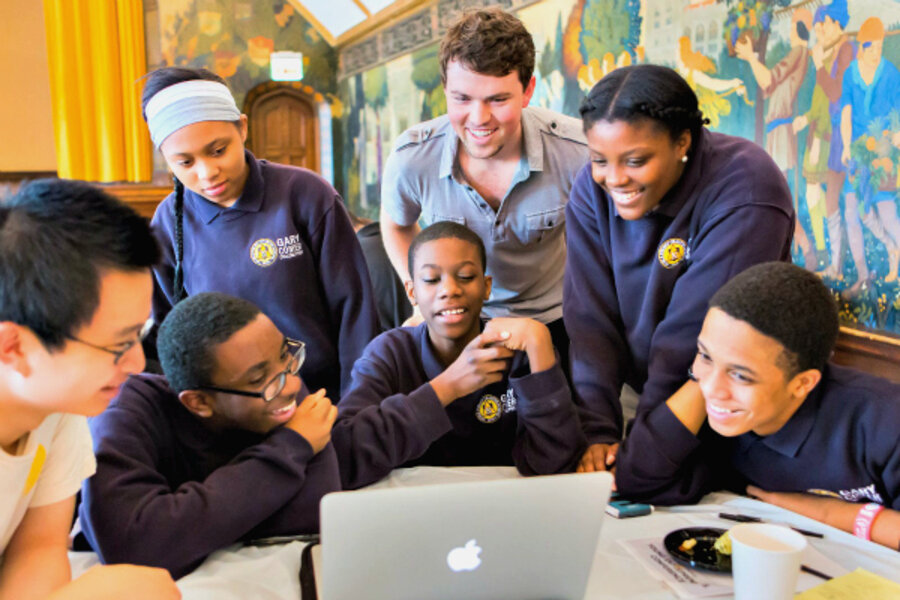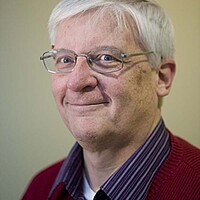Civic Accelerator boosts young businesses who want to do good
Growing up in Los Angeles, Ted Gonder had been helped mightily by an academic mentor, employed by his parents, despite their modest means, to get him back on track in school.
Later, while a student at the University of Chicago in 2008, Mr. Gonder and friends saw how neighborhoods just off campus were being hurt in the emerging Great Recession. While college students were jumping in to assist as academic tutors, he saw a need for something even more basic: a need to help teens gain control over their finances.
American teenagers were scoring lower than ever on tests of financial literacy, the simple task of how to manage their money. Only 13 states now require high schoolers to take a personal finance class in order to graduate. Yet the need for careful money management is growing: The average 20-something today has a significantly lower level of wealth than his or her parents. Saving and spending wisely is more important than ever.
So Gonder co-founded Moneythink, a nonprofit group that match college student volunteers with high schoolers and helps them learn about finances. As a 23-year-old college graduate, Gonder has grown Moneythink into an organization employing 300 mentors on 28 college campuses serving about 1,500 students in cities such as Chicago, Los Angeles, Houston, and New York.
With Moneythink, high schoolers learn three basic skills: how to budget and save; how to use credit and borrow wisely; and how to plan and pay for their higher education. A lot of the job involves persuading teens to change their mindset: The need for better math skills usually isn't the problem.
"Most of these concepts are not that complicated," Gonder says in a recent phone interview. They're practical principles like "the idea of a budget, or saving over time," he says. Moneythink's work "is more about how do you get a student to care?"
For his efforts, Gonder has been honored with an invitation to visit the White House, where he met with President Obama. "It was an incredible experience," he says. And it has opened many doors for Moneythink.
But even more important has been Moneythink's involvement with the Civic Accelerator, a project of the Civic Incubator in Atlanta, itself a part of Points of Light, which bills itself as "the world’s leading volunteer organization with more than 20 years of history and a bipartisan legacy."
"The biggest … factor that has accelerated our growth has been the Civic Accelerator," Gonder says.
The time was right for a program like Civic Accelerator, says Ayesha Khanna, president of the Civic Incubator. The program graduated its first cohort of 10 startup companies in February.
Social technology – Facebook, Twitter, etc. – has given entrepreneurs new power to create social change, she says. "We now have tools we didn't have a decade ago that allow people to organize and scale and act in powerful ways," such as using social media to do crowd sourcing and crowd funding Ms. Khanna says.
The first group of 10 teams (20 people in all), including Moneythink, graduated from the Civic Accelerator in February. Five of the startup businesses were nonprofits; the other five were for-profit businesses that have a goal of solving a social problem. Each team received $10,000 as a seed investment. At the end of the process the teams voted among themselves for one nonprofit and one for-profit startup to receive an additional $50,000 investment.
The February for-profit $50,000 winner was UBELONG, which helps volunteers go to countries around the world to help in "a very affordable way," Khanna says, by staying for a week to six months in the homes of local families. The nonprofit winner was Generation Citizen. which uses mentors to help students put together a plan "to actually change what is happening in their communities," such as start a recycling program. It's all about "bringing civics to life," she says.
Bringing for-profit social entrepreneurs together with traditional nonprofit startups was intentional.
"The nonprofits and for-profit ventures really learn from each other, share a lot of their best practices," Khanna says. "They actually have more similar approaches than differences."
Civic Accelerator is now shuffling through 150 applications to find its next cohort of 10 startups, which will begin their program in May.
"We want to train 120 entrepreneurs over three years, we want to launch 60 ventures, but more importantly we want to engage 250,000 people as part of the solution," Khanna says.
Whether they start a for-profit business or a conventional nonprofit group means less to today's youths. "There's a blurring of lines taking place," Gonder says. "It's really about what's the best possible way we can solve this problem."
A sea change is taking place among young people regarding their careers, Khanna adds.
"They may not say that they want to be a social entrepreneur, but when they describe what they want to do in their life, that's exactly what they're talking about," she says. They say, "I want to make a difference. I want to make money – but I also want to do good."






